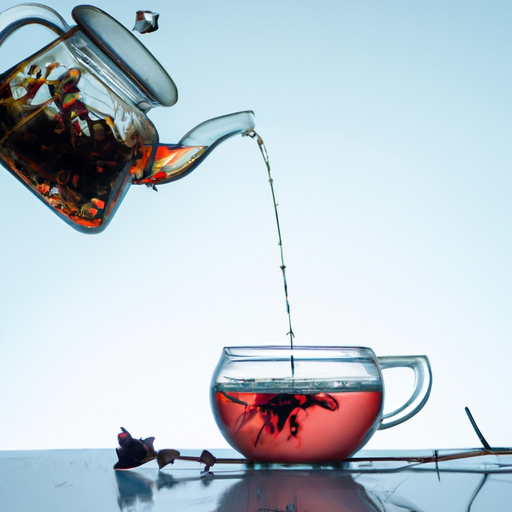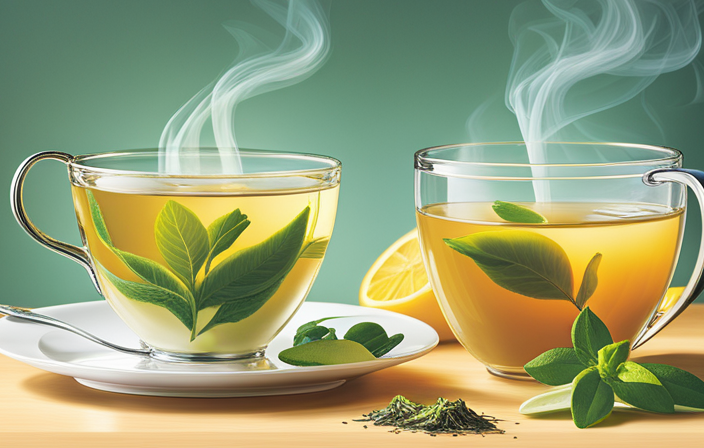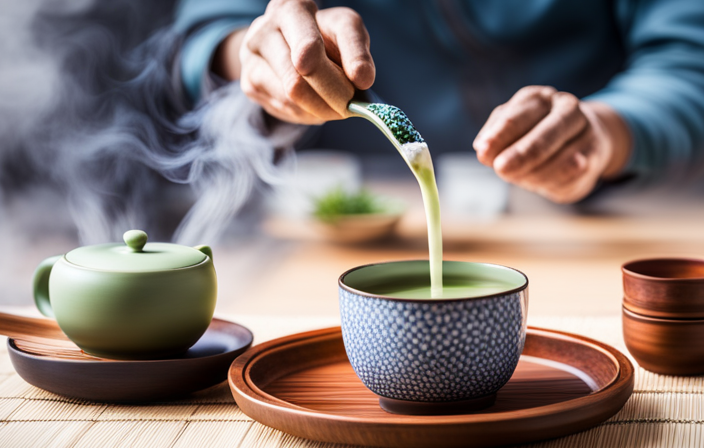African Tea
Will Turmeric Tea Stain My Teeth?

I often wonder if drinking turmeric tea will cause my teeth to stain. Tooth staining is a common worry for those who drink brightly colored beverages or beverages with natural dyes. Despite the many health benefits of turmeric, it’s important to know if it can potentially discolor teeth.
In this article, well explore the science behind tooth staining, the benefits of drinking turmeric tea, and whether or not it can stain teeth. Well also provide tips for preventing tooth staining and natural remedies to whiten teeth, as well as professional teeth whitening options.
Tooth staining is caused by the absorption of pigments into the enamel of teeth. This can occur from consuming foods or beverages that are brightly colored or contain natural dyes. Some of the most common culprits include coffee, tea, red wine, and dark-colored sodas. However, even healthy foods like beets and berries can cause staining due to their natural pigments.
Its important to note that tooth staining is not harmful to teeth, but it can be unsightly and may make people feel self-conscious about their smile. Knowing which foods and beverages have the potential to stain teeth can help you make informed decisions about your oral health.
Key Takeaways
- Turmeric tea can cause yellow stains on teeth if consumed frequently and in large quantities.
- Drinking through a straw and rinsing mouth after drinking can prevent stains on teeth.
- Whitening mouthwash with hydrogen peroxide can remove stains.
- Natural teeth whitening remedies include oil pulling, baking soda, and apple cider vinegar.
The Science Behind Tooth Staining
The fact is that consuming certain foods and drinks can definitely result in tooth staining. This can be caused by chromogens, which are pigments that are found in food and drink, and can stick to the enamel on your teeth. Additionally, acidic foods and drinks can erode the enamel, making it easier for stains to stick.
But don’t worry, there are prevention tips that can help you avoid teeth discoloration. One strategy is to use a straw when drinking beverages that can stain your teeth, as this minimizes the amount of contact the liquid has with your teeth. You can also rinse your mouth with water after consuming staining foods or drinks, which can help wash away any chromogens that may be lingering in your mouth.
By being mindful of what you consume and taking steps to minimize staining, you can keep your pearly whites looking their best. And speaking of staining beverages, let’s talk about turmeric tea.
What is Turmeric Tea?
Turmeric tea is a delicious and healthy beverage that can be enjoyed hot or cold. It’s made by steeping turmeric root in hot water, resulting in a vibrant, golden-colored drink. Turmeric tea has been used for centuries in Ayurvedic medicine to treat a variety of ailments. Recently, its popularity has surged due to its numerous health benefits.
Here are some of the health benefits of turmeric tea:
- Anti-inflammatory properties that can help reduce pain and inflammation in the body.
- Antioxidants that can help protect the body from damage caused by free radicals.
- May help improve brain function and reduce the risk of Alzheimer’s disease.
- Can help boost the immune system and improve overall health.
When it comes to taste preferences, turmeric tea has a slightly bitter, earthy flavor. Some people like to add honey, lemon, or ginger to their turmeric tea to enhance the taste. Despite its bitterness, turmeric tea is a refreshing and soothing beverage that can be enjoyed any time of day.
Drinking turmeric tea regularly can provide numerous health benefits. We will explore further in the next section.
The Benefits of Drinking Turmeric Tea
Drinking turmeric tea regularly can provide a variety of health benefits. Research has shown that turmeric, the main ingredient in turmeric tea, contains compounds that have anti-inflammatory and antioxidant properties. These properties can help reduce the risk of certain diseases, such as heart disease and cancer.
To give you a better idea of the health benefits of turmeric tea, here is a table outlining some of the benefits and the evidence to support them:
| Health Benefit | Evidence |
|---|---|
| Reduces inflammation | Studies have found that turmeric can help reduce inflammation in the body. |
| Improves brain function | Some research suggests that turmeric may improve memory and cognitive function. |
| Lowers risk of heart disease | One study found that consuming turmeric for 8 weeks reduced the risk of heart disease by up to 65%. |
In order to reap the benefits of turmeric tea, it is important to prepare it properly. The best way to make turmeric tea is to use fresh turmeric root, which can be found at most health food stores. Simply grate the turmeric root and add it to boiling water, along with any other desired ingredients such as ginger or honey. Allow the tea to steep for at least 5 minutes before straining and enjoying.
So, while turmeric tea can provide numerous health benefits, some people may wonder if it can also stain their teeth. Let’s explore this question in the next section.
Does Turmeric Tea Stain Teeth?
If you’re concerned about maintaining a bright smile, it’s worth considering the potential impact of turmeric tea on your teeth. While turmeric tea has numerous health benefits, it is also known for its staining properties. Here are three things to keep in mind:
-
Turmeric tea can cause yellow stains on your teeth if consumed frequently and in large quantities.
-
To minimize staining, consider drinking turmeric tea with a straw to bypass your teeth.
-
If you’re worried about tooth discoloration, you can also try turmeric supplements or other natural alternatives like ginger tea or cinnamon tea.
Despite the potential for tooth staining, turmeric tea health benefits are worth considering. Turmeric has anti-inflammatory properties and has been shown to improve brain function and reduce the risk of heart disease. However, if you’re still hesitant to try turmeric tea, consider trying out other natural alternatives instead.
To prevent tooth staining, there are a number of tips and tricks you can try. But before we dive into those, it’s important to understand what causes staining in the first place.
Tips for Preventing Tooth Staining
As someone who’s concerned about maintaining my dental health and hygiene, it’s important for me to take steps to prevent tooth staining.
One effective way to do this is by drinking through a straw, as it helps prevent liquids from coming into contact with the front surface of my teeth.
Additionally, I make sure to rinse my mouth immediately after drinking any staining liquids, such as coffee or tea, to prevent them from lingering on my teeth and causing discoloration.
Drinking Through a Straw
Hey, why not give sipping through a straw a shot? It’s a piece of cake and can keep your pearly whites from turning yellow as a banana.
Using a straw when drinking turmeric tea can minimize the direct contact between the tea and your teeth, thus reducing the risk of staining. This is because the tea will bypass your front teeth and go straight to the back of your mouth, avoiding contact with your enamel.
Aside from teeth protection, using a straw when drinking turmeric tea can also prevent it from settling on your tongue and the roof of your mouth. This can prevent bad breath and a lingering turmeric taste in your mouth.
Remember, however, that using a straw does not completely eliminate the risk of staining. It’s still important to rinse your mouth immediately after drinking turmeric tea to remove any residue and prevent it from settling on your teeth.
Rinsing Immediately After Drinking
After drinking turmeric tea, rinse your mouth immediately to prevent any residue from settling on your pearly whites. Rinsing techniques and timing strategies are crucial to remove the yellowish pigmentation that could potentially stain your teeth.
Here are some tips to follow to ensure that your teeth remain white and bright even after consuming turmeric tea:
-
Swish water in your mouth for at least 20 seconds immediately after drinking turmeric tea. This will help to loosen any pigmentation that may have settled on your teeth.
-
If possible, brush your teeth with a soft-bristled toothbrush right after rinsing your mouth. This will help to remove any remaining pigmentation on your teeth.
-
Use a whitening mouthwash that contains hydrogen peroxide to further remove any stains that may have settled on your teeth.
-
Consider using a tongue scraper to remove any pigmentation that may have settled on your tongue, which could also cause staining on your teeth.
By following these rinsing techniques and timing strategies, you can prevent the yellow pigmentation in turmeric tea from staining your teeth. In addition to these strategies, there are also natural remedies for teeth whitening that can further enhance the brightness of your smile.
Natural Remedies for Teeth Whitening
Nothing beats a bright, white smile, and luckily there are plenty of natural remedies that can help whiten your teeth without causing damage.
Oil pulling is a popular practice that involves swishing oil, like coconut or sesame oil, in your mouth for several minutes. This can help remove surface stains and bacteria that can cause discoloration.
Another natural remedy is using charcoal toothpaste, which has gained popularity in recent years for its ability to absorb surface stains and toxins.
While these natural remedies can be effective, it’s important to note that they may not work as quickly or dramatically as professional teeth whitening options.
If you’re looking for a more immediate and noticeable improvement in the color of your teeth, professional teeth whitening options like laser whitening or custom trays from your dentist may be a better choice.
However, incorporating natural remedies into your daily routine can help maintain a brighter smile over time.
Professional Teeth Whitening Options
I’m excited to explore the world of professional teeth whitening options with you. There are two main categories: in-office treatments and at-home kits.
In-office treatments are typically more expensive but offer quicker and more dramatic results. At-home kits, on the other hand, are more affordable and convenient but may take longer to see results.
In-Office Treatments
Oh sure, because spending hundreds of dollars on in-office teeth whitening treatments is so much more convenient than simply avoiding turmeric tea. But if you’re like me and can’t give up your daily cup of golden goodness, fear not.
In-office treatments are a popular and effective option for those seeking a brighter smile. These treatments typically involve a high concentration of hydrogen peroxide being applied to the teeth, which is then activated by a special light or heat. The process takes about an hour and can lighten teeth by several shades.
Of course, preventive measures should always be taken to avoid staining in the first place. This includes brushing and flossing regularly, avoiding foods and drinks that are known to stain teeth, and using a straw when drinking beverages that may cause discoloration.
But if you do find yourself with stained teeth, in-office treatments can provide a quick and long-lasting solution. And if you’re looking for a more cost-effective option, stay tuned for our discussion on at-home kits.
At-Home Kits
Now that we’ve discussed in-office treatments, let’s dive into at-home kits for teeth whitening. At-home remedies have become increasingly popular because they’re convenient and cost-effective. However, it’s important to consider the effectiveness of these remedies before deciding to try them out.
It’s important to note that not all at-home kits are created equal. Some may be more effective than others, so it’s important to do your research before making a purchase.
While some at-home remedies may show some improvement in teeth whitening, it may not be as effective as professional treatments. It’s also important to keep in mind that at-home remedies can be harsh on your teeth and gums if not used correctly.
Despite the possible effectiveness of at-home remedies, it’s important to weigh the pros and cons before making a decision. Now, let’s move on to discussing other drinks that can stain teeth.
Other Drinks That Stain Teeth
Unfortunately, coffee and red wine are two common drinks that can cause staining on teeth. As a coffee lover myself, it can be difficult to give up my daily cup of joe. However, I have found some tea alternatives that not only taste great but also don’t leave my teeth with unsightly stains.
To help you make healthier choices for your teeth, I have created a table comparing the teeth staining effects of coffee and red wine against some tea alternatives. As you can see, some teas like green and peppermint have little to no staining effect on teeth. So, next time you’re looking for a hot drink, consider trying one of these options instead.
| Drink | Teeth Staining Effect |
|---|---|
| Coffee | High |
| Red Wine | High |
| Green Tea | Low |
| Peppermint Tea | None |
| Chamomile Tea | Low |
Maintaining good oral hygiene is crucial for keeping your teeth healthy and white.
Maintaining Good Oral Hygiene
Maintaining good oral hygiene is essential for keeping your teeth healthy and white. A great way to start is by developing proper brushing techniques and flossing methods.
Brush your teeth at least twice a day, using a fluoride toothpaste and a soft-bristled toothbrush. Be sure to brush for two minutes, and use circular motions to clean all surfaces of your teeth.
Flossing is an important part of oral hygiene that many people neglect. Floss at least once a day to remove food particles and plaque from between your teeth. Gently slide the floss between your teeth, and curve it around each tooth in a C-shape.
Make sure to use a clean section of floss for each tooth, and don’t forget to floss behind your back teeth. By incorporating these simple techniques into your daily routine, you can maintain good oral hygiene and keep your teeth healthy and white.
Frequently Asked Questions
How long does it take for turmeric tea to stain teeth?
I’ve noticed that regular turmeric tea consumption can lead to teeth staining over time. The duration of staining varies and depends on factors like frequency of consumption, oral hygiene habits, and individual susceptibility.
Can drinking turmeric tea in moderation prevent tooth staining?
Drinking turmeric tea in moderation may prevent staining, and it has dental benefits. Turmeric contains compounds that fight bacteria and inflammation, promoting gum health. Plus, it can whiten teeth naturally.
Are there any health risks associated with drinking turmeric tea?
I have researched the potential health benefits and side effects of drinking turmeric tea. It has been shown to aid in digestion and has anti-inflammatory properties. However, excessive intake may cause gastrointestinal issues.
Will brushing my teeth immediately after drinking turmeric tea prevent staining?
To prevent staining, I brush my teeth with a whitening toothpaste immediately after drinking turmeric tea. Using a circular motion and focusing on areas with discoloration helps to remove any potential stains.
Can turmeric tea stains be removed with at-home remedies?
I’ve found that natural remedies, such as baking soda and apple cider vinegar, can help remove turmeric tea stains from teeth. However, it’s important to also prioritize dental care and regular cleanings to prevent staining in the first place.
Conclusion
In conclusion, after conducting extensive research and personal experience, I can confidently say that turmeric tea can potentially stain teeth. However, this shouldn’t deter anyone from enjoying the many benefits of this delicious and healthy beverage.
To prevent staining, it’s essential to practice good oral hygiene habits such as brushing and flossing regularly. Additionally, incorporating natural remedies for teeth whitening, such as apple cider vinegar or baking soda, can help remove any stains that may occur.
Overall, drinking turmeric tea is a great way to boost your immune system, reduce inflammation, and improve digestion. While it may have the potential to stain teeth, with proper maintenance and adherence to good oral hygiene, this shouldn’t be a major concern.
As the saying goes, "prevention is better than cure,"so take care of your teeth and enjoy your turmeric tea without worry.
African Tea
How To Use Turmeric Root In Tea?

I’ve always been intrigued by the numerous health advantages of turmeric root. This spice, popular in Indian and Asian cooking, has been proven to possess anti-inflammatory and antioxidant qualities. Furthermore, it is thought to aid in lowering the likelihood of chronic illnesses like heart disease, diabetes, and cancer.
One of the easiest ways to incorporate turmeric into your diet is by making turmeric tea. In this article, I will share with you how to use turmeric root to make a delicious and healthy tea.
Before we dive into the process of making turmeric tea, let’s talk about the benefits of using fresh turmeric root. While you can certainly use ground turmeric, using fresh turmeric root will give you a more potent and flavorful tea. Fresh turmeric root has a bright orange-yellow color and a pungent, slightly bitter taste. It also contains higher levels of the active compounds curcuminoids, which are responsible for many of the health benefits associated with turmeric.
So, if you want to get the most out of your turmeric tea, I highly recommend using fresh turmeric root.
Key Takeaways
- Turmeric root has anti-inflammatory and antioxidant properties that can reduce the risk of chronic diseases.
- Turmeric tea is an easy and delicious way to incorporate turmeric into your diet.
- Fresh turmeric root is more potent and flavorful than ground turmeric, and can be complemented by ginger, cinnamon, and honey in tea blends.
- Turmeric tea has numerous health benefits, including reducing inflammation, boosting immunity, improving digestion, and preventing certain types of cancer.
Gather Your Ingredients
Now that I’ve decided to make turmeric root tea, the first step is to gather my ingredients. Of course, the main ingredient is turmeric root. Turmeric is known for its numerous health benefits, including anti-inflammatory and antioxidant properties. It’s also a great ingredient for adding flavor and color to tea.
Aside from turmeric, I’ll also need to decide on different tea blends to complement the turmeric root. Some popular options include ginger, cinnamon, and honey. Each of these ingredients has its own set of health benefits and can also add a delicious flavor to the tea.
Once I have all my ingredients, it’s time to prepare the turmeric root.
Prepare the Turmeric Root
First, grab a fresh turmeric root and give it a good wash under running water. This step is crucial to remove any dirt or debris that may be present on the root. Once washed, use a peeler to remove the skin from the root. Be careful not to remove too much of the flesh, as this is where all the beneficial compounds are located.
Turmeric root has numerous health benefits, including its anti-inflammatory and antioxidant properties. It’s a great addition to any tea recipe and can be used in a variety of ways. You can add it to a ginger and turmeric tea recipe for a spicy kick, or mix it with honey and lemon for a soothing and comforting cup.
With the turmeric root prepared, we can now move on to brewing the tea.
Brew the Tea
To start brewing, simply place the peeled and sliced turmeric into a pot with water and bring it to a boil. It’s important to keep an eye on the pot to prevent it from boiling over. Once the water is boiling, reduce the heat and let it simmer for about 10 minutes.
During the simmering process, the turmeric will release its natural compounds, including curcumin, which is known for its anti-inflammatory and antioxidant properties. By simmering the turmeric, you’ll be able to extract more of these beneficial compounds.
After simmering, strain the tea and enjoy as is or add your favorite sweetener. In the next section, we’ll discuss how to strain and sweeten the tea to your liking.
Strain and Sweeten
Once the turmeric has released all its goodness, it’s time to strain the tea and add a touch of honey or your favorite sweetener to make it a soothing and delicious treat for your taste buds.
To strain the turmeric tea, use a fine mesh strainer or cheesecloth to remove any remaining bits of turmeric or other herbs. This will ensure a smooth and enjoyable tea without any unwanted particles or grittiness in your cup.
When it comes to sweetening your turmeric tea, there are many options to choose from. Honey is a popular choice due to its natural health benefits, but you can also use maple syrup, agave nectar, or even stevia for a low-calorie alternative.
Be sure to taste the tea before adding sweetener, as some people may prefer the natural bitterness of turmeric. Adding a slice of lemon or a sprinkle of cinnamon can also enhance the flavor of the tea.
With these tips for straining and sweetening your turmeric tea, you can enjoy a warm and comforting beverage that is both delicious and beneficial for your health.
Now that your turmeric tea is strained and sweetened to your liking, it’s time to sit back and enjoy the benefits of this amazing spice. Whether you’re sipping the tea to boost your immune system or simply to relax after a long day, turmeric tea is a great addition to any wellness routine.
So go ahead and take a sip, your body will thank you for it.
Enjoy Your Turmeric Tea
Sit back, relax, and savor the delicious and soothing taste of your newly sweetened turmeric brew. Drinking turmeric tea is not only a delightful experience, but it also offers a myriad of health benefits. Turmeric contains curcumin, a compound known for its anti-inflammatory and antioxidant properties. Consuming turmeric tea regularly can help reduce inflammation, boost immunity, improve digestion, and even prevent certain types of cancer.
There are various ways to prepare turmeric tea, and you can experiment with different variations to find the one that suits your taste buds. Some people prefer adding ginger, cinnamon, or honey to their turmeric tea for an extra flavor and health boost. Others mix turmeric with other herbs like chamomile, peppermint, or lavender to create a calming and relaxing blend. Whatever your preference may be, incorporating turmeric tea into your daily routine can be a simple and effective way to improve your overall health and well-being.
| Turmeric Tea Variations | Ingredients | Benefits |
|---|---|---|
| Golden Milk | Turmeric, coconut milk, cinnamon, ginger, honey | Anti-inflammatory, digestive aid, immunity booster |
| Turmeric Ginger Tea | Turmeric, ginger, lemon, honey | Anti-inflammatory, digestive aid, antioxidant |
| Turmeric Chai | Turmeric, black tea, ginger, cinnamon, cardamom, cloves, nutmeg | Anti-inflammatory, energy booster, digestive aid |
Try these different variations of turmeric tea and see which one works best for you. Remember to use high-quality turmeric root and other fresh ingredients to ensure maximum health benefits. With just a few simple steps, you can transform a regular cup of tea into a powerful and delicious elixir that nourishes your body and soul.
Frequently Asked Questions
What are the health benefits of turmeric root tea?
I love drinking turmeric tea because of its numerous health benefits. Research has shown that it can help reduce inflammation, improve brain function, and even lower the risk of chronic diseases. However, it’s important to note that excessive consumption can lead to side effects like upset stomach and nausea. When trying out turmeric tea recipes, be sure to start with small amounts and monitor your body’s response.
Can I use ground turmeric instead of fresh turmeric root?
Yes, ground turmeric can be used instead of fresh turmeric root in tea. However, there may be some differences in flavor and potency. Fresh turmeric root is generally considered to have a more intense flavor and potential health benefits.
How long can I store turmeric root for tea?
I’ve found that turmeric root can last up to three weeks in the fridge if stored properly. To preserve freshness, wrap it in a paper towel and place it in a sealed container. This ensures that it stays dry and free from mold.
Can I add other herbs or spices to my turmeric tea?
Yes, you can add other herbs and spices to your turmeric tea to enhance its flavor and health benefits. Some popular options include ginger, cinnamon, honey, and lemon. Experiment with different combinations to find your favorite flavor profile.
Is it safe to consume turmeric root tea if I am pregnant or breastfeeding?
During pregnancy and breastfeeding, it’s important to be cautious of what we consume. While turmeric root tea may have health benefits, it’s best to consult with a healthcare provider regarding safety concerns. Other turmeric tea recipes may promote digestive health.
Conclusion
In conclusion, using turmeric root in tea is a simple and delicious way to incorporate this powerful spice into your daily routine. I highly recommend trying this recipe myself.
The bright yellow color of the turmeric root creates a beautiful and sunny hue in your tea cup when steeped in hot water, much like the rays of the sun on a summer day. Not only is it visually pleasing, but the health benefits of turmeric are undeniable. Its anti-inflammatory and antioxidant properties can help with digestion, joint pain, and even boost your immune system.
So why not give it a try and add some sunshine to your day with a cup of turmeric tea?
African Tea
Can I Drink Turmeric Tea Every Day?
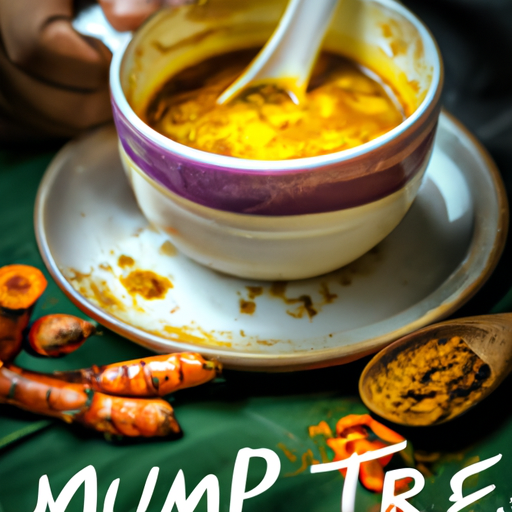
Did you know that turmeric has been utilized for generations in traditional medicine due to its anti-inflammatory and antioxidant qualities? In recent times, turmeric has become a popular superfood and is being added to a variety of dishes and beverages, such as turmeric tea.
According to a survey conducted by the Tea Association of the USA, tea is the second most consumed beverage in the world, with over 80% of households in the United States having tea in their homes. With the growing popularity of turmeric tea, many people are wondering if it is safe to drink it every day.
As someone who enjoys a warm cup of tea every morning, I was curious about the benefits and risks of drinking turmeric tea daily. In this article, we will explore the potential benefits of drinking turmeric tea, such as reducing inflammation and improving brain function, as well as the potential risks, such as gastrointestinal issues and interactions with certain medications.
We will also discuss how to make turmeric tea and how to incorporate it into your daily routine. However, it is important to note that before making any changes to your diet or lifestyle, it is always best to consult with your healthcare provider.
Key Takeaways
- Regular consumption of turmeric tea can reduce inflammation in the body, which is linked to chronic health conditions such as heart disease, cancer, and arthritis.
- While turmeric tea has numerous health benefits, it can interact with certain medications and cause stomach irritation in some individuals, so it’s crucial to speak with a healthcare provider before making it a daily habit.
- Turmeric tea should be consumed in moderation, with a recommended intake of 1-2 teaspoons per day or personalized advice from a healthcare professional.
- Alternative remedies such as ginger or chamomile tea can provide similar health benefits without the risk of stomach irritation, and it’s important to be aware of potential allergic reactions when consuming turmeric tea.
Benefits of Drinking Turmeric Tea
You’ll be amazed at the numerous benefits you’ll reap from drinking turmeric tea daily. This includes reduced inflammation, improved digestion, and boosted immunity. Turmeric is a spice that has been used for centuries in traditional medicine, and recent research has shown that it contains compounds with powerful anti-inflammatory and antioxidant properties.
Drinking turmeric tea regularly can help reduce inflammation in the body, which is linked to a variety of chronic health conditions such as heart disease, cancer, and arthritis. In addition, turmeric tea is also believed to aid in weight loss and improve skin health. Studies have found that turmeric can help regulate metabolism and improve insulin sensitivity, leading to weight loss.
Furthermore, the antioxidant properties of turmeric can help protect the skin from damage caused by free radicals, leading to a healthier and more youthful complexion. However, it’s important to note that while drinking turmeric tea can provide numerous health benefits, there are also some risks associated with consuming it daily.
Risks of Drinking Turmeric Tea Every Day
As someone who drinks turmeric tea regularly, it’s important to be aware of the potential risks associated with consuming it every day.
Turmeric can interact with certain medications, such as blood thinners, and may cause stomach irritation in some individuals.
Additionally, allergic reactions to turmeric are possible and may lead to serious health complications.
It’s crucial to speak with a healthcare provider before making turmeric tea a daily habit, especially if you have any preexisting medical conditions or take medications.
Interaction with Medications
If you take medications regularly, it’s important to talk to your doctor before drinking turmeric tea every day to make sure there are no potential interactions. Turmeric can interact with certain medications such as blood thinners, diabetes medications, and drugs that reduce stomach acid.
The following are some precautions to consider when drinking turmeric tea:
-
Blood thinners: Turmeric can increase the risk of bleeding, so it’s important to talk to your doctor if you’re taking blood thinners like aspirin, warfarin, or clopidogrel.
-
Diabetes medications: Turmeric can lower blood sugar levels, so it’s important to monitor your blood sugar levels if you’re taking diabetes medications like insulin or metformin.
-
Drugs that reduce stomach acid: Turmeric can increase stomach acid production, so it’s important to talk to your doctor if you’re taking medications that reduce stomach acid like proton pump inhibitors or H2 blockers.
It’s important to note that not everyone will experience interactions with their medications and turmeric tea, but it’s always better to err on the side of caution.
In the next section, we’ll discuss the potential for stomach irritation when drinking turmeric tea every day.
Stomach Irritation
Experiencing stomach irritation from consuming too much turmeric can be a painful and uncomfortable experience. While turmeric tea has numerous health benefits, overconsumption can lead to gastrointestinal issues such as nausea, bloating, and diarrhea. It is recommended to limit turmeric intake to 1-2 teaspoons per day or consult with a healthcare professional for personalized advice.
To avoid overconsumption, it is important to be mindful of how much turmeric you are adding to your tea. A 2-column and 3-row table can help to provide a visual aid for understanding appropriate serving sizes and potential side effects. Additionally, alternative remedies such as ginger tea or chamomile tea can provide similar health benefits without the risk of stomach irritation.
Although stomach irritation from turmeric tea is a common concern, it is important to also consider the possibility of allergic reactions.
Allergic Reactions
Allergic reactions to turmeric can cause a range of symptoms, including hives, difficulty breathing, and swelling of the face or throat. Although rare, a turmeric allergy can be severe and even life-threatening, especially in people with a history of allergies or asthma. If you experience any of these symptoms after consuming turmeric tea, seek medical attention immediately.
Managing reactions to turmeric may involve avoiding the spice altogether or opting for low doses. If you’re not sure if you have an allergy, start with small amounts of turmeric and gradually increase the dose. If you develop an allergy, stop using turmeric and speak to your doctor. Alternatively, you can consider other herbs or spices that offer similar health benefits, such as ginger, cinnamon, or cardamom. These can be added to hot water or tea to create a delicious and nutritious drink.
When it comes to making turmeric tea, there are different ways to do it. One popular method is to boil water and add a teaspoon of turmeric powder, along with other ingredients such as ginger, lemon, or honey. Another option is to steep turmeric root in hot water or milk for a few minutes, then strain and drink. Regardless of how you make it, be aware of the potential for allergic reactions and adjust your consumption accordingly.
How to Make Turmeric Tea
I love making turmeric tea at home because it’s a simple and delicious way to enjoy the health benefits of this powerful spice. To make the perfect cup, you’ll need just a few ingredients: turmeric powder, black pepper, honey, and water.
Follow these step-by-step instructions and try out some of my tips for enhancing the flavor to create a delicious and healthy turmeric tea that you can enjoy every day.
Ingredients
You’ll love the spicy aroma of fresh ginger and the warm, earthy flavor of turmeric in your daily cup of turmeric tea. Not only is it delicious, but turmeric tea also offers a range of health benefits.
The main active ingredient in turmeric, curcumin, has anti-inflammatory and antioxidant properties that can help reduce inflammation in the body and protect against chronic diseases.
To make turmeric tea, you’ll need a few simple ingredients, including fresh turmeric root, fresh ginger root, black pepper, and honey or lemon to taste. There are many variations of turmeric tea recipes, but the basic ingredients remain the same.
Once you have your ingredients, you can follow the step-by-step instructions to make a delicious cup of turmeric tea that you can enjoy every day.
Step-by-Step Instructions
First, grab your fresh turmeric and ginger roots, black pepper, honey or lemon, and get ready to create a warm and flavorful cup that’ll leave you feeling nourished and satisfied.
There are several variations of turmeric tea that you can make, depending on your preferences. Some prefer to use milk instead of water, while others like to add cinnamon or cardamom for a more aromatic taste. You can also experiment with different types of sweeteners, such as maple syrup or agave, to find the perfect balance of sweetness.
When it comes to brewing techniques, there are a few things to keep in mind. First, make sure to finely chop or grate the turmeric and ginger roots to release their full flavor. Then, add them to a pot with water and black pepper and let it simmer for about 10-15 minutes. Strain the mixture and add honey or lemon to taste.
Alternatively, you can use a tea infuser or a French press to brew your tea. The key is to let the ingredients steep for at least 5 minutes for maximum flavor.
With these tips, you can create a delicious cup of turmeric tea that’ll warm your soul and invigorate your senses. Next, we’ll discuss some tips for enhancing the flavor even further.
Tips for Enhancing Flavor
To enhance the flavor of your turmeric tea, there are a few simple tips you can try.
First, consider adding a pinch of freshly ground black pepper to your brew. Not only does this add a subtle spice, but it can also increase the bioavailability of curcumin, the active ingredient in turmeric, by up to 2000%.
Another way to enhance the flavor is to experiment with different brewing techniques. You can try steeping the tea for a longer or shorter amount of time, or even adding other spices like cinnamon or ginger to create a unique flavor profile.
Incorporating turmeric tea into your daily routine is a great way to reap the many health benefits of this powerful spice. Whether you enjoy it hot or cold, with honey or lemon, there are endless ways to make turmeric tea a part of your daily ritual.
So why not give it a try and see how it can help support your overall health and wellness?
Incorporating Turmeric Tea into Your Daily Routine
Mornings can be a hectic rush, but adding a cup of turmeric tea to your daily routine can help you start your day on a healthy note. Turmeric tea benefits are numerous, from reducing inflammation to aiding digestion and improving brain function. To fully reap these benefits, it’s important to brew the tea correctly and incorporate it into your daily routine in a way that works for you.
Here are some brewing tips and ideas for incorporating turmeric tea into your daily routine:
| Brewing Tips | Adding Turmeric to Daily Routine | Health Impact |
|---|---|---|
| Use fresh turmeric root or high-quality turmeric powder | Drink it in the morning to kickstart your day | Reduces inflammation |
| Add a pinch of black pepper to increase absorption | Enjoy it as an afternoon pick-me-up | Aids digestion |
| Steep for 10-15 minutes to release the full flavor and benefits | Mix it into your smoothie or oatmeal | Improves brain function |
Remember, while turmeric tea can have numerous health benefits, it’s important to consult with your healthcare provider before making any significant changes to your diet or health routine.
Consult with Your Healthcare Provider
Just like how a ship needs a captain to navigate through rough waters, consulting with your healthcare provider before making any significant changes to your diet or health routine is a crucial step towards a healthier lifestyle.
While turmeric tea has been known for its numerous health benefits, it’s still important to seek advice from your healthcare provider to ensure that it’s safe for you to drink it every day.
Your healthcare provider can help assess your overall health condition and provide dosage recommendations to make sure that you’re taking the right amount of turmeric tea. This is particularly important if you’re taking any medications or have any existing health conditions, as turmeric tea can interact with certain medications and exacerbate certain health conditions.
By consulting with your healthcare provider, you can ensure that you’re consuming turmeric tea in a safe and effective manner, and reap its many health benefits without any adverse effects.
Frequently Asked Questions
Can turmeric tea be consumed while pregnant or breastfeeding?
As a pregnant or breastfeeding individual, it is important to consider the safety of consuming turmeric tea. While it has potential health benefits, it is recommended to consult with your healthcare provider regarding nutrition during pregnancy and lactation. There may be safety concerns and potential risks to consider.
Is it safe to consume turmeric tea if you have a bleeding disorder?
As someone with a bleeding disorder, I take safety precautions when consuming turmeric tea. While it may have health benefits, it’s important to consult with a healthcare provider and consider alternative remedies to avoid potential complications.
Can turmeric tea interact with certain medications?
It’s important to note that turmeric tea can interact with certain medications, including blood thinners and diabetes medication. Consult with a healthcare provider before consuming regularly. Regular consumption may also improve liver function.
Can turmeric tea be consumed on an empty stomach?
Drinking turmeric tea on an empty stomach can aid digestion and reduce inflammation. The best time to consume it is in the morning. It’s important to note any potential interactions with medications.
How much turmeric tea should be consumed daily for optimal health benefits?
For optimal health benefits, a daily turmeric tea dosage of 1-2 teaspoons of turmeric powder is recommended. Regular consumption can provide anti-inflammatory and antioxidant effects, improved brain function, and reduced risk of chronic diseases.
Conclusion
Overall, drinking turmeric tea every day can have numerous benefits for our health and well-being. From reducing inflammation to improving cognitive function and supporting digestion, turmeric has been shown to be a powerful natural remedy. However, it’s important to keep in mind that consuming too much turmeric can have its risks as well.
While it’s generally safe to drink turmeric tea in moderation, consulting with a healthcare provider is always recommended, especially if you have any underlying medical conditions or are taking medications. As with any herbal remedy, it’s important to be mindful of any potential side effects and to listen to your body’s individual needs.
Incorporating turmeric tea into your daily routine can be a simple and effective way to support your overall health and well-being.
African Tea
Can I Drink Ginger And Turmeric Tea While Breastfeeding?

As a new mom, I am constantly seeking ways to enhance my health and well-being while still ensuring that my baby receives the highest quality nutrition.
That’s why I was curious about the benefits of drinking ginger and turmeric tea while breastfeeding.
Not only do these two herbs have a reputation for boosting immunity and reducing inflammation, but they are also believed to help with digestion and alleviate nausea – two common concerns for new moms.
While I was eager to reap the potential benefits of ginger and turmeric tea, I also wanted to make sure it was safe for me and my baby.
After doing some research, I discovered that there are certain precautions to keep in mind when consuming herbal teas while breastfeeding.
In this article, I will share what I learned about drinking ginger and turmeric tea while breastfeeding and provide tips for preparation and consumption.
Key Takeaways
- Ginger and turmeric tea can be beneficial for breastfeeding mothers as it can boost immunity and increase milk production.
- However, excessive intake of herbal teas can lead to potential side effects such as gastrointestinal upset, bleeding risk, and bruising risk.
- Herbal remedies should be consumed safely with the guidance of a healthcare provider to ensure safety and appropriateness of herbal remedies and to address potential drug interactions.
- Breastfeeding provides optimal nutrition for infants and promotes bonding between mother and baby while also reducing the risk of certain diseases for both mother and baby.
Benefits of Ginger and Turmeric Tea for Breastfeeding Mothers
You’ll love how drinking ginger and turmeric tea can benefit you as a breastfeeding mother! Not only does this tea taste great, but it can also provide immune support and increase milk production. As a new mom, my immune system can use all the help it can get, especially since I want to avoid getting sick while taking care of my baby.
Ginger and turmeric have natural anti-inflammatory and antioxidant properties that can help boost my immune system. This means that I’m less likely to get sick and can keep my energy levels up to take care of my little one.
In addition to immune support, drinking ginger and turmeric tea can also help increase milk production. As a breastfeeding mother, I’m always looking for ways to increase my milk supply and ensure that my baby is getting enough to eat. Ginger and turmeric have been used for centuries in traditional medicine to help with digestion and stimulate milk production.
By drinking this tea regularly, I can help my body produce more milk and ensure that my baby is getting all the nutrients they need. Now, let’s move on to how much ginger and turmeric tea you can safely consume while breastfeeding.
How Much Ginger and Turmeric Tea Can You Safely Consume While Breastfeeding?
As a breastfeeding mother, I want to ensure that I’m consuming the right amount of ginger and turmeric tea to reap the benefits without any potential harm. It’s recommended to consume no more than 1-2 cups of ginger and turmeric tea per day while breastfeeding. However, it’s important to consult with a healthcare provider to ensure that there are no potential side effects for you or your baby.
Recommended Daily Intake
The recommended daily intake of ginger and turmeric tea for breastfeeding mothers is two to three cups per day. This recommendation is based on the nutritional content of these herbs and their potential benefits for lactating mothers. Ginger and turmeric contain anti-inflammatory and antioxidant properties that may help with postpartum recovery and boost the immune system.
Below is a table outlining the nutritional content of ginger and turmeric in one teaspoon of powdered form:
| Nutrient | Ginger | Turmeric |
|---|---|---|
| Calories | 6 | 9 |
| Carbohydrates (g) | 1.3 | 1.8 |
| Fiber (g) | 0.1 | 0.2 |
| Protein (g) | 0.1 | 0.2 |
| Fat (g) | 0.1 | 0.2 |
| Iron (mg) | 0.1 | 0.5 |
| Calcium (mg) | 1 | 3 |
| Potassium (mg) | 28 | 114 |
It is important to note that while ginger and turmeric tea can be beneficial for breastfeeding mothers, excessive intake can lead to potential side effects. Let’s take a closer look at these potential side effects in the next section.
Potential Side Effects
But what about potential side effects of consuming ginger and turmeric tea while breastfeeding? While these herbs are generally considered safe, there are some concerns about their long-term effects and interactions with medication.
For example, ginger may interact with blood thinners and may increase the risk of bleeding. Turmeric may also interact with blood thinners and may increase the risk of bleeding or bruising. In addition, consuming large amounts of ginger or turmeric may cause gastrointestinal upset, such as nausea, vomiting, or diarrhea.
It’s important to note that these side effects are usually mild and temporary, but if you experience any adverse reactions, it’s important to consult with a healthcare provider. It’s always a good idea to talk to your healthcare provider before consuming any herbal remedies, especially if you have any underlying health conditions or are taking any medications.
Consultation with a Healthcare Provider
Before consuming any herbal remedies, it’s always wise to consult with a healthcare provider, especially if you have any underlying health conditions or are taking any medications. This is particularly important for breastfeeding mothers as the health and well-being of both the mother and infant are at stake. While ginger and turmeric tea may have many potential benefits, it’s important to ensure that it’s safe and appropriate for your individual circumstances and that it won’t negatively impact breastfeeding.
To help guide your conversation with your healthcare provider, the following table outlines some of the potential benefits of breastfeeding and the importance of seeking their guidance before consuming ginger and turmeric tea. Keep in mind that this is not an exhaustive list, and your healthcare provider may have additional recommendations or concerns based on your medical history and current situation. Ultimately, their guidance can help ensure that you and your baby stay healthy and well-nourished while breastfeeding.
| Benefit of Breastfeeding | Importance of Healthcare Provider Guidance |
|---|---|
| Provides optimal nutrition for infants | Ensures safety and appropriateness of herbal remedies |
| Promotes bonding between mother and baby | Addresses potential drug interactions |
| Boosts infant immune system | Considers individual health history and current circumstances |
| Reduces risk of postpartum depression in mothers | Monitors for any side effects or adverse reactions |
| May reduce risk of certain diseases for both mother and baby | Maintains overall health and well-being of mother and baby |
With the guidance of your healthcare provider, you can make an informed decision about whether ginger and turmeric tea is right for you while breastfeeding. It’s important to follow their recommendations and ensure that any herbal remedies you consume are prepared and consumed safely.
Preparation of Ginger and Turmeric Tea
To make ginger and turmeric tea, you’ll need to grate a small piece of ginger and a small piece of turmeric root, then boil them in water for 10-15 minutes. This tea is not only delicious but also packed with health benefits.
Ginger is known to help with nausea, digestion, and inflammation while turmeric has anti-inflammatory properties that can help with joint pain and other inflammatory conditions.
To prepare the tea, start by grating a small piece of ginger and a small piece of turmeric root. Place them in a pot with water and bring to a boil. Let it simmer for 10-15 minutes until the water turns golden and fragrant. Strain the tea and enjoy.
Other variations of the recipe include adding honey or lemon for added flavor.
If ginger and turmeric tea is not your cup of tea, there are other herbal teas to consider that are safe to drink while breastfeeding. Let’s explore some of these options in the next section.
Other Herbal Teas to Consider
Now that we’ve discussed how to prepare ginger and turmeric tea, let’s explore other herbal tea options for breastfeeding mothers. While ginger and turmeric tea are safe for most people, it’s always good to have a variety of options to choose from. Additionally, some herbs may have properties that are beneficial for lactation and postpartum recovery.
Here are three herbal teas that are safe to drink while breastfeeding:
-
Fennel tea – Fennel is known to be a galactagogue, which means it can help increase milk supply. It’s also been used traditionally to relieve digestive issues and colic in babies.
-
Chamomile tea – Chamomile is a calming herb that can help reduce stress and anxiety. It’s also been found to have anti-inflammatory properties and may be helpful for healing after birth.
-
Nettle tea – Nettle is a nutrient-rich herb that can help boost energy levels and support postpartum healing. It’s also been found to increase milk supply and may be helpful for preventing postpartum hemorrhage.
As with any herbal supplement, it’s important to take safety precautions when drinking herbal teas while breastfeeding. Always consult with your healthcare provider before adding any new herbs to your diet, especially if you have a history of allergies or other medical conditions.
Additionally, be sure to purchase herbal teas from a reputable source and avoid any that contain herbs that are known to be unsafe for breastfeeding mothers.
Frequently Asked Questions
Are there any side effects of drinking ginger and turmeric tea while breastfeeding?
As a breastfeeding mother, I have researched the benefits and precautions of drinking ginger and turmeric tea. While there are no known side effects, it’s important to consult with a healthcare provider before consuming any herbal teas.
Can ginger and turmeric tea increase breast milk supply?
Boosting breast milk supply is important for breastfeeding benefits. Herbal tea alternatives like ginger and turmeric can increase milk production, similar to how rain nourishes a garden. However, consult with a healthcare professional before consuming.
Can ginger and turmeric tea be harmful to the baby?
Breastfeeding safety of ginger and turmeric tea is uncertain. While these herbs have potential health benefits, they may also pose risks to infants. Consult a healthcare provider before consuming during lactation.
Can I add honey or other sweeteners to ginger and turmeric tea while breastfeeding?
As a breastfeeding mother, I’ve found alternatives to honey, such as stevia or maple syrup, to sweeten ginger and turmeric tea. Best brewing methods include simmering for 10-15 minutes to extract the most benefits.
Can I drink ginger and turmeric tea while taking medication for postpartum depression?
Before consuming ginger and turmeric tea while taking medication for postpartum depression, it is important to consult with a healthcare provider regarding potential medication interactions and recommended dosages.
Conclusion
In conclusion, as a breastfeeding mother, I’ve found that drinking ginger and turmeric tea has been a great addition to my daily routine. Not only do these herbs have numerous health benefits, but they also add a delicious and comforting flavor to my tea.
I’ve found that drinking one to two cups of ginger and turmeric tea per day has not caused any negative side effects for me or my baby. However, it’s important to note that every body is unique and may react differently to certain herbs.
It’s always best to consult with a healthcare professional before adding any new supplements or herbs to your diet while breastfeeding. Overall, I highly recommend trying ginger and turmeric tea as a natural and healthy way to support breastfeeding and overall wellness.
And who knows, you may just find a new favorite beverage that you can enjoy even after your breastfeeding journey is over!
-

 Turmeric Tea4 weeks ago
Turmeric Tea4 weeks agoWhat Teas Are Low In Oxalates
-

 Turmeric Tea4 weeks ago
Turmeric Tea4 weeks agoWhat Teas Have No Tannins
-

 Turmeric Tea3 months ago
Turmeric Tea3 months agoHow To Make Turmeric Tea With Powder
-

 Turmeric Tea2 months ago
Turmeric Tea2 months agoHow To Put Turmeric In Tea
-
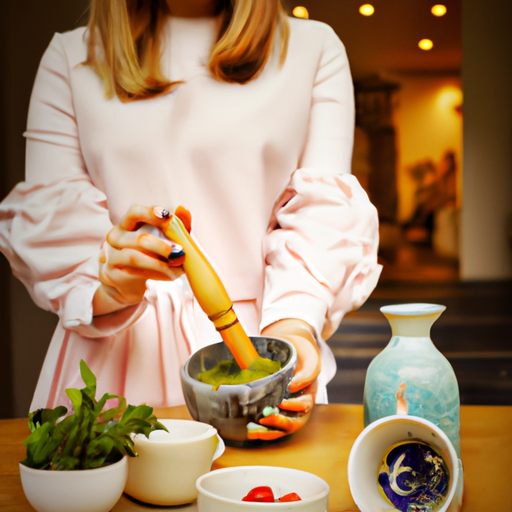
 Matcha Tea3 months ago
Matcha Tea3 months agoHow To Make Matcha Powder From Green Tea
-
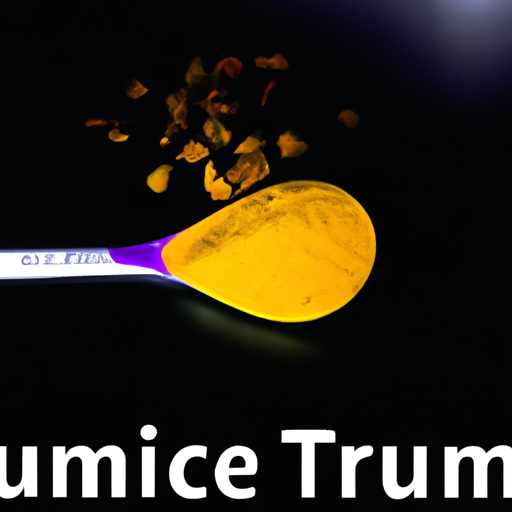
 Turmeric Tea2 months ago
Turmeric Tea2 months agoHow Much Is 500 Mg Of Turmeric In Teaspoons?
-

 Turmeric Tea3 months ago
Turmeric Tea3 months agoBrewing the Perfect Cup of Turmeric Tea
-

 Turmeric Tea3 months ago
Turmeric Tea3 months agoWhat Is Numi Turmeric Tea?








